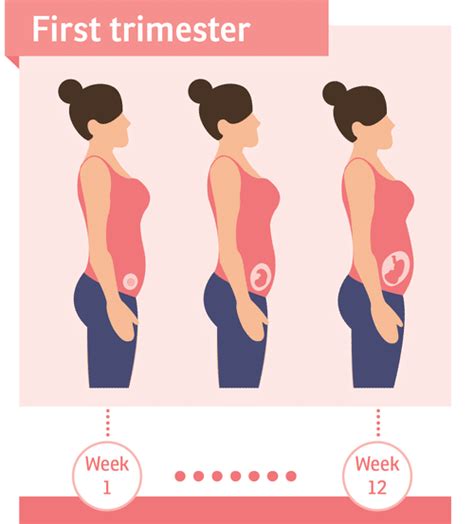What to Expect in the First Trimester
The first trimester of pregnancy is a time of significant changes and adjustments for both the mother-to-be and the developing baby. From week to week, a multitude of symptoms can arise, ranging from physical discomforts to emotional shifts. Here is a comprehensive week-by-week guide to help expectant mothers navigate the initial stages of their pregnancy journey:

Week 1-2: Implantation and Early Pregnancy Signs
- Implantation bleeding: Light spotting or bleeding that occurs as the fertilized egg implants into the uterine lining (10-25% of pregnancies).
- Mild cramping: Similar to period cramps, caused by the uterus expanding.
- Breast tenderness: Breasts may become swollen and sensitive due to hormonal changes.
- Nausea: Known as morning sickness, although it can occur at any time of day (up to 80% of pregnancies).
- Fatigue: Extreme tiredness and difficulty sleeping due to hormonal fluctuations and increased blood production.
Week 3-4: Rise in hCG and Increased Symptoms
- Increased nausea and vomiting: Morning sickness may intensify.
- Frequent urination: As the uterus grows, it puts pressure on the bladder.
- Constipation: Progesterone can slow down digestion.
- Headaches: Hormonal changes and increased blood flow can cause headaches.
- Food cravings and aversions: Changes in taste preferences can develop.
Week 5-6: Fetal Development and Symptoms Intensify
- Embryo’s heart starts beating: Around week 5, the embryo’s heart begins to beat.
- Morning sickness usually peaks: Symptoms of nausea and vomiting tend to be at their strongest.
- Breast tenderness and enlarged areola: Breasts continue to be tender and the areola (darkened area around the nipple) expands.
- Increased vaginal discharge: Cervix produces more discharge to protect the pregnancy.
- Emotional sensitivity: Hormonal changes can lead to increased mood swings and emotional outbursts.
Week 7-8: Organogenesis and Subsiding Symptoms
- Organogenesis begins: Major fetal organs, including the brain, heart, and lungs, begin to develop.
- Morning sickness may start to subside: For many women, nausea and vomiting gradually diminish.
- Fatigue and headaches: These symptoms may also start to improve.
- Weight gain: Some women may experience gradual weight gain.
- Heightened sense of smell: Increased sensitivity to odors can occur.
Week 9-12: Fetal Growth and Notable Changes
- Fetal growth spurt: The baby grows rapidly in size and length.
- Uterine contractions (Braxton Hicks): Intermittent, irregular contractions that prepare the body for labor.
- Abdominal pain or bloating: The uterus expands, causing discomfort and bloating.
- Pelvic pain: Pressure on the pelvic muscles can lead to discomfort.
- Facial swelling: Fluid retention can cause swelling in the face and hands.
Week 13-16: Second Trimester Transition
- Energy levels increase: Hormonal fluctuations may stabilize, improving fatigue.
- Morning sickness resolves: Symptoms of nausea and vomiting should subside for most women.
- Baby’s movements become apparent: Some women may start feeling fetal movements known as “quickening.”
- Lightening: The baby’s head drops down into the pelvis, reducing pressure on the diaphragm and easing breathing.
- Skin changes: Hyperpigmentation (darkening of the skin) can occur in certain areas.
Tips and Tricks for Managing First Trimester Symptoms
- Stay hydrated: Drink plenty of fluids to prevent dehydration and ease constipation.
- Eat small frequent meals: Avoid large portions that can worsen nausea.
- Rest adequately: Prioritize sleep and relaxation to cope with fatigue.
- Exercise moderately: Engage in light exercises to improve circulation and reduce discomfort.
- Manage stress: Practice relaxation techniques such as yoga, meditation, or deep breathing.
- Connect with support: Join support groups or seek professional help if necessary to address emotional challenges.
Common Mistakes to Avoid in the First Trimester
- Self-treating: Always consult your healthcare provider before taking any medications or supplements.
- Skipping prenatal appointments: Regular prenatal care is crucial for monitoring both the mother’s and baby’s health.
- Ignoring symptoms: Report any concerning symptoms promptly to your healthcare provider.
- Consuming unsafe foods: Avoid raw or undercooked meat, poultry, fish, and unpasteurized dairy products.
- Excessive caffeine intake: Limit caffeine consumption to less than 200mg per day.
Why the First Trimester Matters
- Critical for fetal development: Major organ systems and structures are formed during the first trimester.
- Establishes a strong foundation: Healthy habits in the first trimester contribute to a positive pregnancy outcome.
- Identifies potential risks: Early prenatal care allows for timely identification and management of any potential complications.
Benefits of Managing First Trimester Symptoms
- Improved well-being: Managing symptoms can enhance the mother’s physical and emotional comfort.
- Reduced risk of complications: Some symptoms, such as severe nausea and vomiting, can lead to dehydration and electrolyte imbalances if not addressed.
- Enhanced fetal health: Managing symptoms ensures the fetus receives adequate nutrients and oxygen for proper development.
Conclusion
The first trimester of pregnancy is an eventful period marked by a diverse range of symptoms. Understanding these symptoms week by week can help expectant mothers anticipate and manage their experiences effectively. By following proper prenatal care guidelines, adhering to healthy habits, and seeking support when needed, women can navigate the first trimester with confidence and optimize the health of both themselves and their growing baby.
Hot Search Title:
Navigating the First Trimester of Pregnancy: A Week-by-Week Guide for 2025
Tables for Easy Reference
| Week | Common Symptoms | Less Common Symptoms |
|---|---|---|
| 1-2 | Implantation bleeding, mild cramping | Fatigue, breast tenderness |
| 3-4 | Increased nausea, frequent urination | Constipation, headaches |
| 5-6 | Breast tenderness, enlarged areola | Food cravings/aversions, vaginal discharge |
| 7-8 | Morning sickness subsides, fatigue improves | Weight gain, heightened sense of smell |
| Week | Fetal Development | Maternal Changes |
|---|---|---|
| 1-2 | Embryo implants, cell division begins | Hormonal changes, breast tenderness |
| 3-4 | Embryo’s heart starts beating | Nausea, vomiting, food aversions |
| 5-6 | Major organogenesis | Uterine expansion, vaginal discharge |
| 7-8 | Fetal growth spurt | Braxton Hicks contractions, abdominal pain |
















